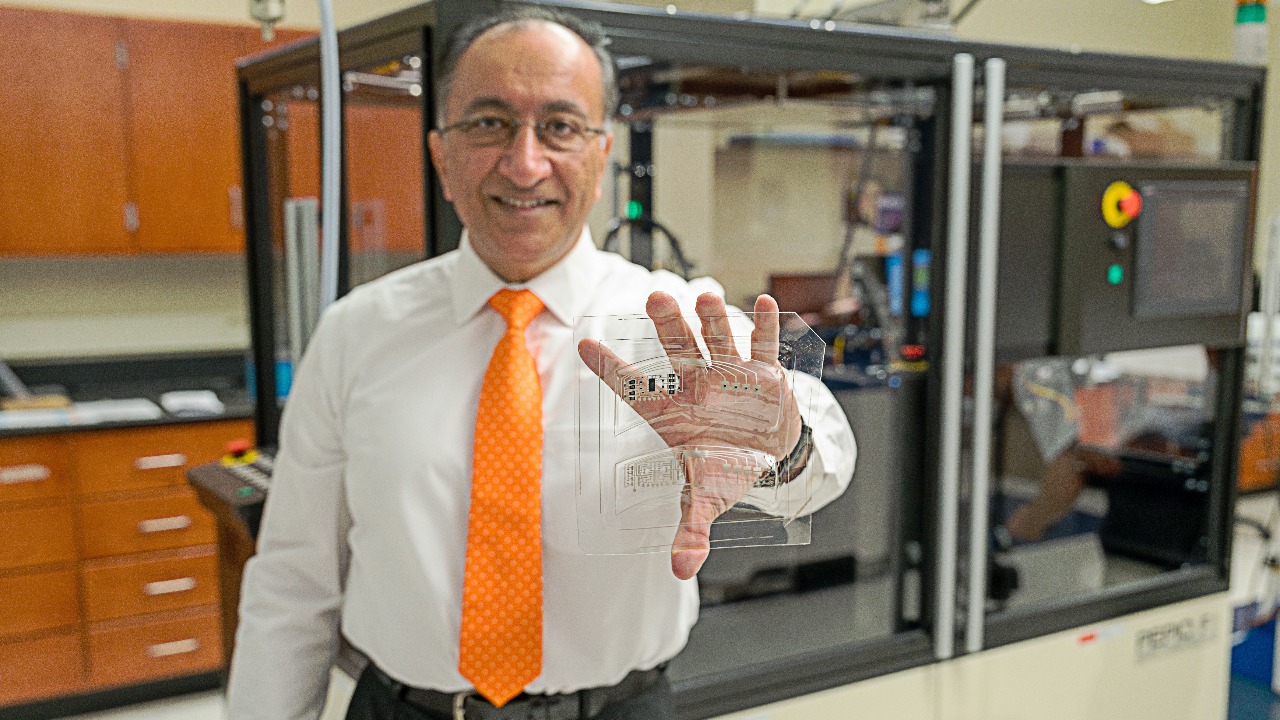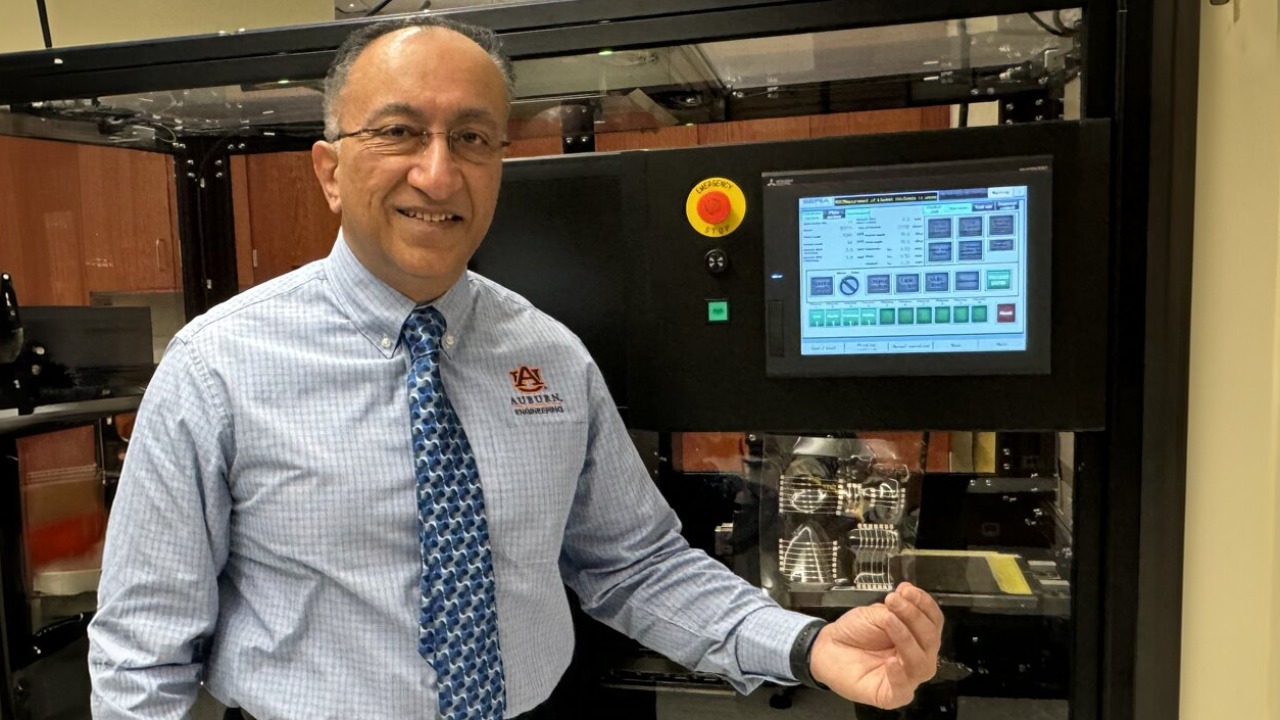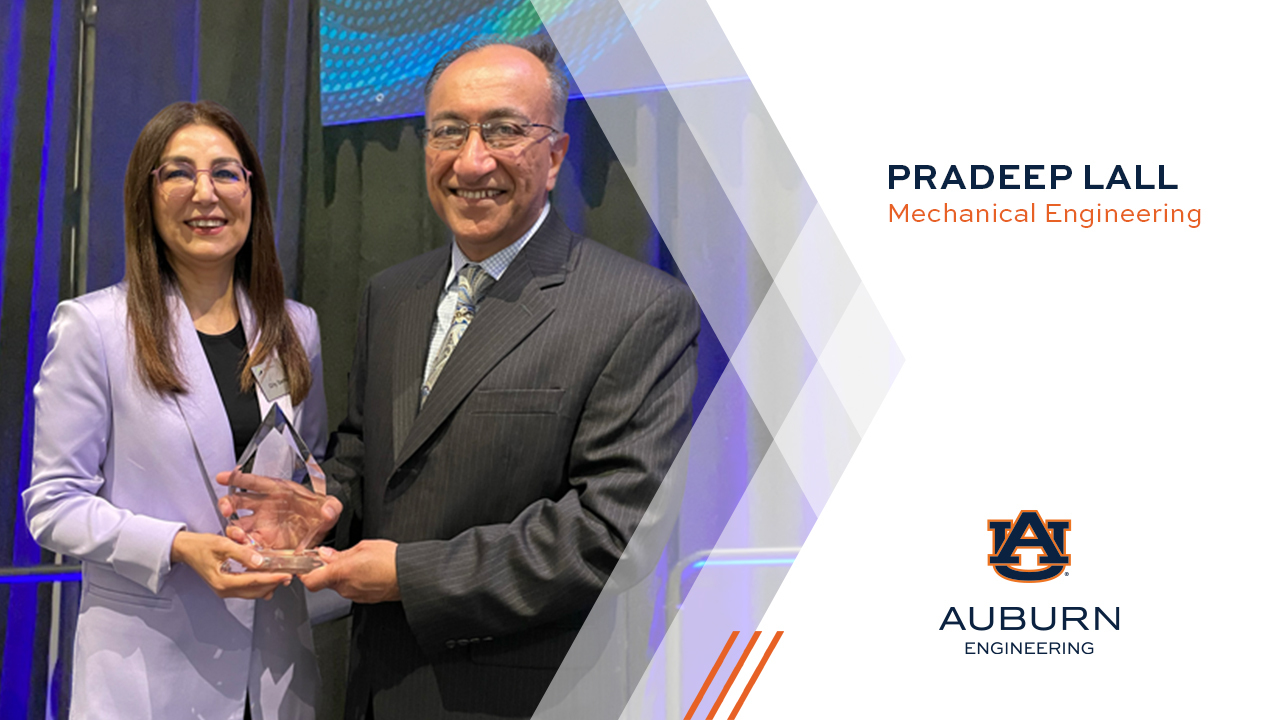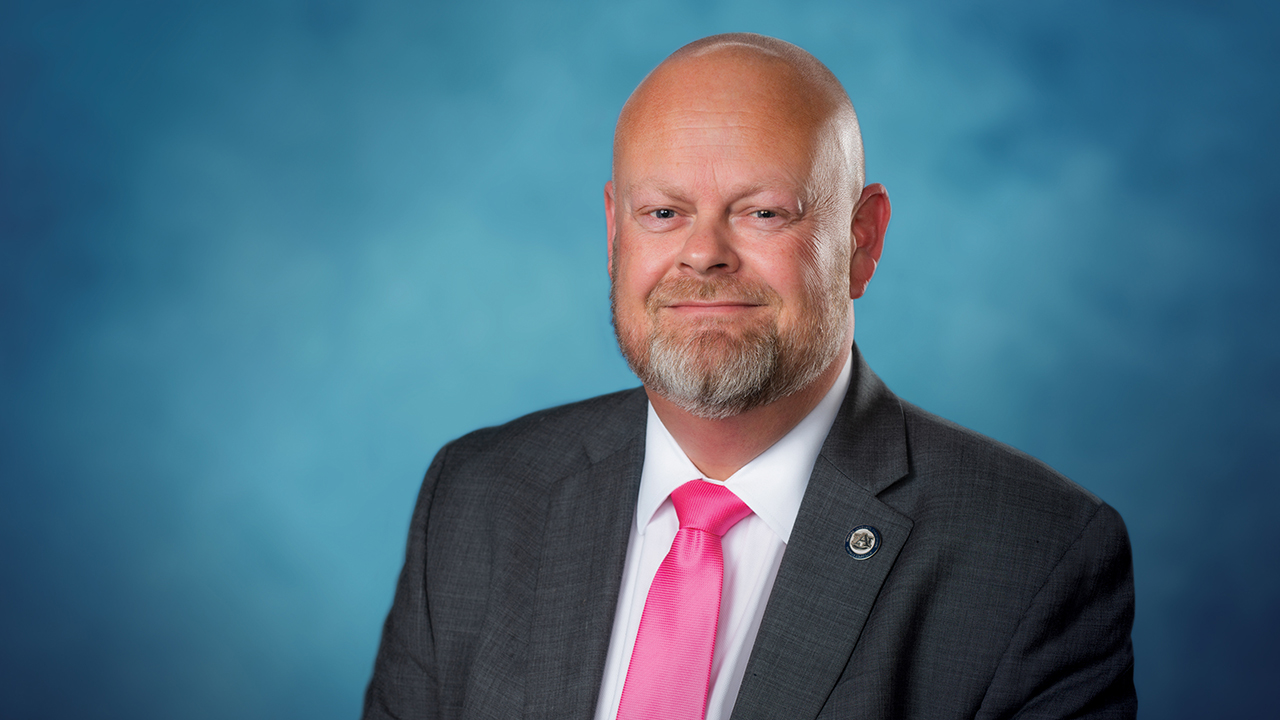Electronics Research Institute
AUERI Lab Tours
AUERI offers personal facility tours of our labs. Tours Showcase our collection of Addtive printed Flexible Hybrid Electronic Printers, Reliability testing machinery and our modelling and simulation tools. Please reach out to Josh Pearson to schedule a lab tour today!
Contact Information:
Email: jpearson@auburn.edu
Phone: (334)-844-1896
Electronics Sustainability Focus of Mechanical Engineering Professor's Latest SRC Program Success
The decades-long legacy of competitively won Semiconductor Research Corporation (SRC) programs secured by Pradeep Lall continues to grow.
Lall, the MacFarlane Endowed Distinguished Professor and Alumni Professor in the Department of Mechanical Engineering, recently won a $315,000 SRC proposal focused on the development and characterization of non-per- and polyfluoroalkyl substance (non-PFA) materials for electronics packaging.
SRC, a globally renowned high-technology consortium consisting of more than 20 premier semiconductor companies, selected Lall’s proposal in a two-stage competition consisting of a white paper followed by a full proposal. Lall is the long-time director of the Auburn University Electronics Research Institute, which has achieved global prominence for advancements in extreme environment electronic systems under his tenure. He previously served the institute as associate director.
“PFAS are used for a number of functions in the design and fabrication of electronic packaging," Lall said, "but the robust carbon-fluorine bond used in PFAS persists in nature long after the use life of the product."
Often called "the forever chemical," PFAS have been detected in water and food supplies, and studies have linked them to a number of detrimental health effects.
"The important functions fulfilled by current generation PFAS in electronics and the dearth of non-PFAS solutions have made combatting those effects a challenging problem,” Lall said.
Identifying environmentally friendly solutions to that problem has been a sustained focus of Lall’s research. His team is also working on developing sustainable additively manufactured electronics using water-based inks under a different competitively won program under the NextFlex Project Call 7.
“Our team has continued to look for ways to advance methods for manufacture and realize sustainable electronics,” Lall said. “The use of water in additive processes targets the elimination of toxic waste resulting from the volatile organic solvents used in the carriers of the prior generation of additive inks.”
In 2006, Lall developed modeling solutions for the use of lead-free electronics in harsh high-strain rate environments in accordance with the Environmental Protection Agency’s Removal of Hazardous Substances initiative; in 2022, Lall earned the ASME Avram Bar-Cohen Medal for similar research in electronics packaging.
Lall calls efforts toward eliminating PFAS electronics "one of the seismic shifts" in the electronics industry.
"The pervasive nature of electronics in everyday life, along with the volume of electronics and the pace of technology progression, has translated to a significant increase in electronics waste,” he said. “There are indications of impending regulations regarding the elimination of all PFAS from consumer products. Owing to the connected nature of the electronics supply chain, any such regulations would impact electronics at all levels, from chips to systems.
"The development of non-PFAS solutions for electronics will yield lasting benefits for the current and future generations. We're proud to be leading that charge.”
Facility Augmentations
Keyance VR-6200 Keyence VHX-S750E
Streamlines image capturing and alaysis process by combining the capabilities of multiple analytical tools into one system. Functions as a stereoscopic, metallurgical, scanning electron, andmeasuring microscope.

Nisene JetEtch Pro
The JetEtch Pro delivers unsurpassed results by providing unique and precise software control of all aspects of the decapsulation process

ATMA AT-60PD Digital Electric Flat Screen Printer
For screen-printing substrates in Flat Sheet/Board form made of non-deforming materials

Auburn Center’s FHE Reputation Underscored with Multiple Winning Additively Manufactured Electronics Proposals
If you're trying to gauge Auburn's preeminence in harsh environment electronics resiliency development and flexible hybrid electronics (FHE) research, look no further than the latest project call of the NextFlex National Manufacturing Institute.
In last year’s Project Call 7 competition, there were two winning Auburn proposals. In the current Project Call 8? Three, collectively funded at $2.5 million with a 1:1 cost-share — all focused on additively manufactured (AM) FHE, all competitively won by teams led by Pradeep Lall, the MacFarlane Endowed Distinguished Professor and Alumni Professor of Mechanical Engineering and director of the Auburn University Electronics Research Institute (AUERI).
Under Lall's 15-year leadership, AUERI has grown exponentially. In 2015, Lall led the Auburn team contributing to the winning proposal that resulted in the foundation of the NextFlex National Manufacturing Institute. Auburn is a tier-1 founding member of NextFlex, whose mission is to advance U.S. manufacturing of FHE; Lall serves on the NextFlex technical council and has previously served on the governing council of the institute.
The design of electronics for operation in harsh environments has long been an area of research for both Lall and AUERI. While earning an international reputation for designing electronics for operation in harsh environments relative to automotive, military, defense, and downhole applications, AUERI also accelerated the growth of the flexible hybrid electronics industry itself.
Project 1: In-Mold Flexible Electronics for Harsh Automotive Applications
The topic of Lall's first winning Project Call 8 proposal is a perfect example. The $1 million Auburn-led project with a 1:1 cost-share aims to use additive manufacturing in developing in-mold flexible electronics reliability for harsh automotive applications with parts and solutions suppliers including John Deere, Toyota Motors, BayFlex, and MacDermid Alpha as partners.
“A large part of the weight of the automotive vehicle is in the form of wire harnesses," Lall said. "The harnesses carry signals from sensors, interfaces, and modules to the control units located throughout the vehicles for the purpose of guidance, navigation, and control. The wire harnesses alone may contribute almost 200 pounds to the weight of the passenger car. The transition to additive technologies for the replacement of wire harnesses with in-mold electronics will enable size reduction, weight reduction, and thus, reduction of the carbon footprint, which has been a key metric for automotive design with increased emphasis on greater fuel efficiency."
Project 2: Sustainable Electronics
Lall's second winning Project Call 8 project, funded at $1 million with a 1:1 cost-share, is titled "Biodegradable Substrates, Low-Temperature Cure Water-Based Inks, Room Temperature Interconnects and Rework for Sustainable Electronics." This project partners Lall's Auburn-led team with industry partners TapeCon, BayFlex, and NovaCentrix.
"Conventional electronics uses plate-and-etch processes for manufacture," Lall said. "The waste streams may contain metals and dielectrics, in addition to other toxic chemicals. Additive manufacturing processes allow for the reduction in the amount of production waste, minimizing the impact on the environment. The earlier generation of additive methods still used volatile organic carrier fluids for the realization of manufactured circuits. The current generation of substrates is not biodegradable and thus contributes to the waste. In addition, the use of higher temperature processing requires high energy consumption for production processing."
Project 3: Additive Die Packaging for Cryogenic and High-Temperature Operations
In the third program, Lall's team of Auburn researchers will serve as a major subcontractor for Boeing. Titled "Additive Die Packaging for Cryogenic and High-Temperature Operations," the project is funded at a cost of $500,000, including a 1:1 cost-share.
“Electronics packaging has been identified as a critical technology for the continued progression through heterogeneous integration," Lall said. "A number of harsh environment applications often need a high mix and low volume of modules for specific applications. Traditional electronic packaging manufacturing techniques require expensive hard tooling that needs a high volume to allocate the upfront cost of installed infrastructure. The use of additive manufacturing methods allows accommodation for high-mix, low-volume designs and opens up new possibilities for launching new products that may not exist in the current state-of-the-art manufacturing methods."
As for the application and broader impact of the program? "Well, it aligns with the national emphasis of the packaging in the Chips Act with the establishment of the National Advanced Packaging Manufacturing Program (NAPMP)," Lall said. "There is a dearth of high-volume packaging manufacturing capabilities in the United States. Access to additive manufacturing processes for packaging solutions will allow the re-entrenchment of a critical portion of the electronics manufacturing supply chain onshore.”
Lall expects the three programs to also benefit AUERI's leading work toward developing FHE reliability standards. “We are honored and excited," he said, "to have an opportunity to work on these forward-looking programs that will be impactful on the future of electronics manufacturing."
AUERI Researchers Win Scholarships from IPC Education Foundation in 2023
Ten AUERI student Researchers have been awarded with prestigious scholarship from IPC education Foundation (IPCEF) in 2023. The IPCEF provides scholarships and awards that support skills pathways and prepare students to start a meaningful career in the electronics manufacturing and assembly industry. They have awarded $40000 scholarships and awards and $25000 towards IPC student members for their accomplishments in IPC student chapters throughout colleges United States. This Scholarship has been awarded to 36 student researchers helping to support them in enhancing their knowledge and skills of real-word industry-related experiences in the field of electronic packaging. The AUERI Researchers who won this award are as follows:
- Sabina Bimali
- Fatahi Musa
- Daniel Karakitie
- Padmanava Choudhury
- Aathi Pandurangan
- Madhu Kasturi
- Md Golam Sarwar
- Ved Soni
- Vishal Mehta
- Shriram Kulkarni
SMTA Student Chapter Booth at Auburns’ Engineering Day.
Engineering Day is one of the largest recruiting events on campus, aimed at helping recruit 7th-12th grade students to the College of Engineering. The involvement and contribution of the SMTA officers were pivotal in representing the chapter, engaging with attendees, and providing insights into the exciting projects and activities undertaken by the SMTA. We received positive feedback from attendees, who expressed enthusiasm for the opportunities presented within the SMTA and the Auburn chapter.







